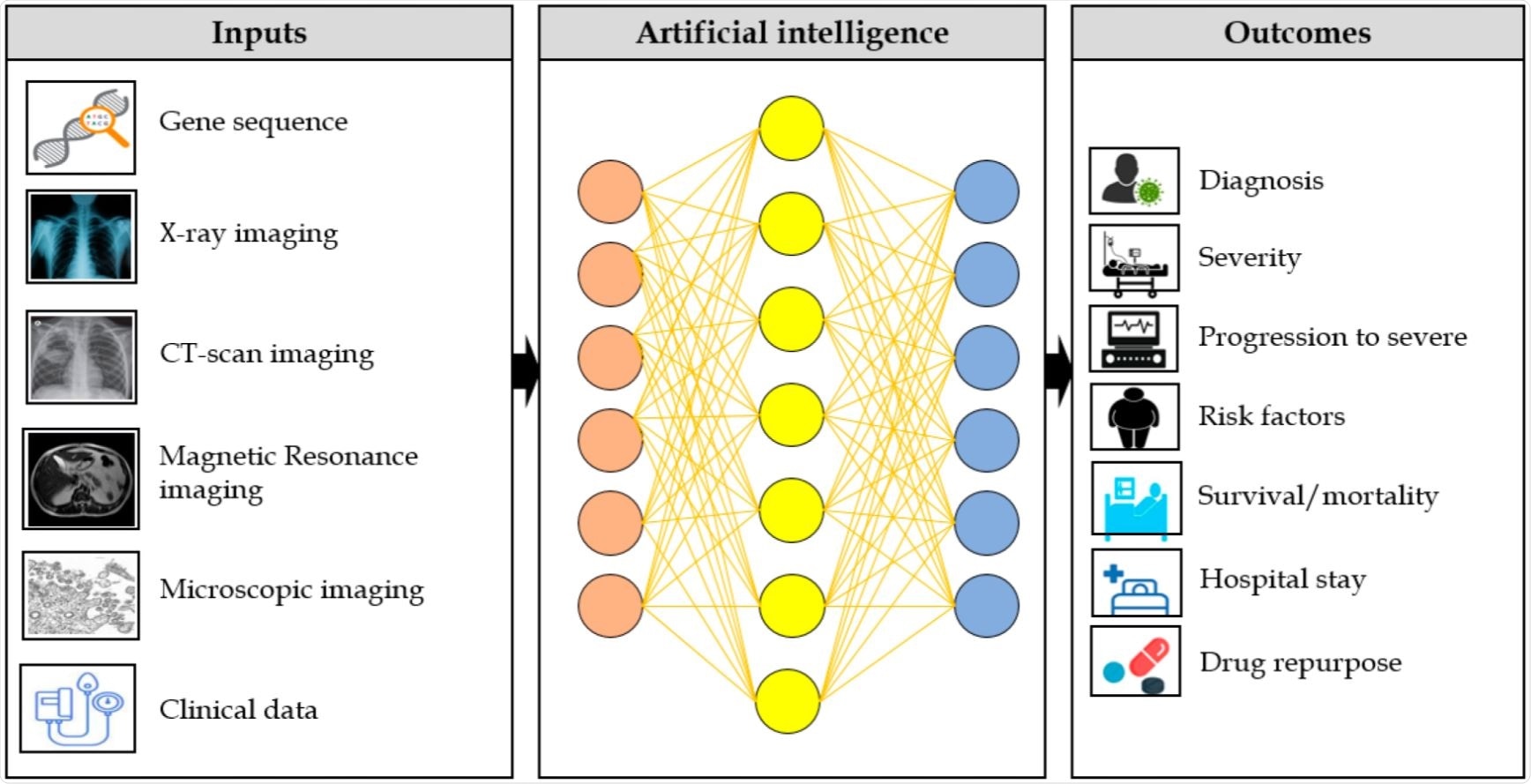To tackle SARS-CoV-2, scientists developed a handful of vaccines that directly target the virus or block its entry into the body. However, there are no new treatments available for COVID-19 disease, and most of the clinical therapies are aimed at coping with the symptoms. Several repurposed drugs, such as remdesivir, have been tested and approved to treat severe COVID-19 patients.
Due to the lack of specific treatments, research is still underway in developing novel therapies.
Artificial intelligence (AI) has been found to be an effective method of addressing various issues in a variety of fields, so it is easily apparent that it is well suited to assisting COVID-19.
A study based in Taiwan and published in the Journal of Clinical Medicine focuses on the role of AI in managing COVID-19 through digital images, clinical and laboratory analysis such as screening and diagnosis.

Application of AI to fight COVID-19
AI models
With AI algorithms illustrating abilities in predicting and diagnosing epidemiological trends of diseases, it is possible that it can also be applied to combat COVID-19.
The Taiwanese paper outlines an overview of AI algorithms that run from random forest, a simple diverse and high-functioning algorithm founded by Tin Kam Ho. This algorithm works by generating multiple decision trees and averaging them in order to make an accurate prediction.
There are also other machine learning algorithms such as support vector machine (SVM), which is usually utilized in classification and regression problems, or the convolutional neural network (CNN) algorithm which consists of several network layers such as input, convolutional, max pooling, average pooling, and output layers. The CNN model has proven efficient performance, and this potentiates its use in a clinical setting for COVID-19.
Artificial neural networks (ANNs) are one of the main tools in AI. The neural networks used in ANNs are modeled after the neurons of a biological brain.
Potential for COVID-19
With infection rates of the SARS-CoV-2 virus rocketing across countries worldwide, the dependence on healthcare systems has been immense. This dependence has caused a lack of beds for severely infected patients as well as limited supplies. Digital images such as X-rays and CT scans can be used to detect abnormalities in COVID-19 patients, and recently deep learning has shown that digital images can be used to detect the disease itself accurately.
The paper illustrates how the development of AI can be used to assist physicians to screen COVID-19 patients effectively and aid with the consequence of limited supplies that can happen during pandemics.
The study mentions a paper by Kumar et al., who developed a machine learning-based classification system to predict outcomes for infected patients. Additionally, Karim et al. developed an explainable deep learning prediction model using 15,959 chest radiography images from three categories of patients (COVID-19, normal, and pneumonia), and upon evaluation of their model, the positive results appeared to drive precision and recall.
Exploring AI limitations
Although AI can be advantageous for COVID-19, the study outlines how the use of these machine learning models such as CNN in a clinical setting can have limitations.
The AI research underlying these applications lacks a representative sample size, external validation, as well as an appropriate model evaluation which suggests that it would be unreliable for clinical use.
A high degree of bias may be present in studies that examine the use of these algorithms, and thus their findings in clinical settings may be unreliable.
However, with many patients being hospitalized due to severe COVID-19 infections, AI could help identify predictors for disease severity, which can help physicians and healthcare workers with the triage process and enable them to prioritize patients based on severity and mortality risk.
This application has been explored by Cai et al., who used CT images of infected patients to develop a prediction model that stratifies disease severity into groups, including moderate, severe, and critical cases.
The review from Taiwan explores how the application of AI could help with COVID-19 infection rates through its use in predicting disease severity and mortality as well as other tasks such as COVID-19 detection and repurposing drugs to find effective drug candidates.
The paper concludes that although these applications would be significant for COVID-19, more research in this area is required to assess the actual efficacy of using AI models in a real-life clinical setting.
Journal reference:
- Islam, M., Poly, T., Alsinglawi, B., Lin, M., Hsu, M. and Li, Y., 2021. A State-of-the-Art Survey on Artificial Intelligence to Fight COVID-19. Journal of Clinical Medicine, 10(9), p.1961. https://www.mdpi.com/2077-0383/10/9/1961/htm